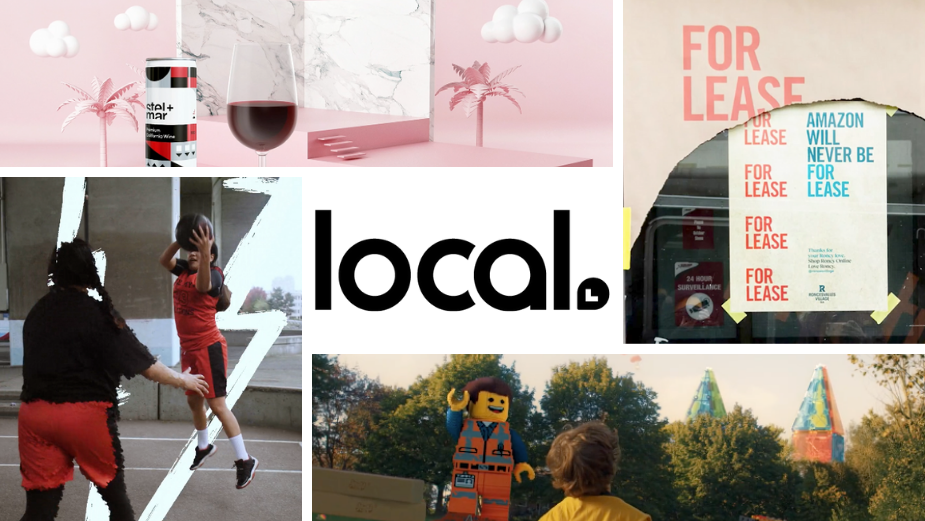
The Local Collective: “We’re Not the Advertising, We’re the Graffiti”

Around three and a half years ago, Matt Litzinger and Kaitlin Doherty had an idea. Having worked together in various capacities over the course of their careers to date, the pair had long acknowledged that theirs was a remarkably productive creative combination. “It always felt like whenever our brains got together, there was some kind of magic,” recalls Kaitlin.
But it was only when inspiration truly struck one evening in 2019 that the duo decided to take the plunge and set up the company which would come to be known as The Local Collective (TLC). “We’d noticed this huge increase in the amount of work that was breaking through which didn’t have massive media buys,” says Matt. “We set out to figure out what was happening and why. We found that stuff was performing really well when it connected with audiences in a way which really resonated with them, and spoke in an incredibly clear and specific way.”
This was an insight which has gone on to underpin TLC’s creative philosophy. Matt and Kaitlin identify it simply as ‘less broad, more specific’. In other words, a tendency to move away from creativity made with broad brushstrokes and a desire to zero in on specific aspects of humanity which would, in turn, appeal to big audiences because of their universality.
As the company’s website puts it, “To harness the power of Local, we start as small and narrow as possible. We start with the most intimate truths of an experience and build from there. When you have to do something small, it forces smarter thinking, unexpected solutions and, ultimately, better creative output.”
It’s an approach which, to date, has been paying dividends for TLC. Their globally-awarded work has included the inspired ‘Not For Lease’, a campaign wherein the storefronts of an entire Toronto street were boarded up in a visceral indication of what might be in store if we didn’t shop locally. More recently, it also inspired the impactful I ATE THANK YOU campaign, in which the critical impact of food banks across Canada was recognised and celebrated.
Above: I ATE THANK YOU was designed to showcase the power of donations to Canada’s food banks.
“I like to compare it to the film Napoleon Dynamite,” reflects Matt. “This was an oddball film about an oddball kid, who hung out with his oddball friends in an oddball town in America. But whether you’re in London, New York City, or the Midwest, people engaged with that movie and it was relevant to them. That’s the power of specificity - you don’t need to speak to everyone at the same time in order to be relevant.”
Overall, it’s an approach which lends itself to work which stands out because of its authenticity. As Matt puts it, “we’re not the advertising, we’re the graffiti”. In terms of finding practical examples of that philosophy coming to life, it’s hard to look beyond ‘Not For Lease’.
Above: TLC’s ‘Not For Lease’ campaign shocked Torontonians with a provocative view of a potential near-future without any functioning high street stores.
Going Local Is a Two-Way (High) Street
“When we first saw the brief, it all seemed so simple,” says Kaitlin. “The objective was to get people to shop locally. What was important was that we didn’t need to persuade people why they needed to shop locally - they already knew the importance of that. Our job was to get them to act on that understanding and actually do it!”
That problem speaks to the kind of ‘say-do gap’ which has frustrated generations of advertisers and activists alike. But, through their unique creative approach, TLC managed to turn sentiment into reality.
“We needed to make sure people felt that their purchasing decisions really mattered, and meant something to the community around them,” says Matt. “Again, this was obviously a campaign directed very specifically at one community in Toronto, but what we’re talking about here resonates all over the world. People need to feel like they have a connection to - and a stake in - the environment around them. At the end of the day, everyone deserves to feel like a local.”
Undoubtedly, the campaign has had an effect. “We put that project together nearly a year and a half ago, and we still have people referring to it when we speak about new work”, says Kaitlin. “I think, as Matt says, that’s because it’s a local experience which is shared by just about everyone on the planet.”
On top of that, there’s reason to believe that widespread cultural changes since the pandemic have also shone a light on the demand for a local-first approach all across the planet.
We’re All Locals Now
In an enormous piece of analysis published in March of last year, the Pew Research Centre set about tracking how our lives had changed as a result of the pandemic. Amongst the concerns regarding disruption and safety, the report uncovered a curious ‘unexpected upside’: People felt a deeper sense of connection to their communities.
Sentiments such as “life has slowed down and brought friends and families closer” and “people in my community seem to be interested in helping each other out” speak to a change in attitudes that further underlines some of the cultural changes identified by Kaitlin and Matt.
“When you talk about people connecting with their communities, I tend to think this is part of a movement which actually began in a negative way with the rise in nationalism across much of the Western world in the past decade,” observes Matt. “You had culture starting to look inward and become a bit more protective. But that movement then got put into a blender because of the pandemic where ‘protecting your own’ turned into ‘protecting your community”. It meant looking after people around you - your neighbour, your dry cleaner, your butcher, your grocery store, you name it. It’s now about protecting the things you care about."
On top of that, Kaitlin points out that ‘feeling like a local’ has always been something we actively want to achieve. “When you go on vacation, you never want to flock to the tourist traps - you want to find out where the locals go and immerse yourself in a culture,” she says. “For a brand, tapping into that can offer experiences that are so much deeper and long-lasting than adopting an overly broad approach. It’s a chance to create something truly special."
For their part, TLC practice what they preach by embedding themselves into their own community in Toronto. “I think it’s especially important in advertising to have that grounded connection, because when you do so much of your work globally you can lose sight of what’s authentic and what’s around you,” says Kaitlin. “Apart from a beer cart or a ping pong table, our agency culture is part of the neighbourhood that we work in.”
At a time of increasing uncertainty, that provides something of a comforting thought. Perhaps, when all is said and done, a big part of why the future can be exciting is because it can be local.













